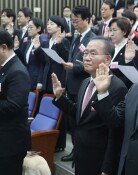Crowds gather to see `Centennial Debate between 2 Michaels`
Crowds gather to see `Centennial Debate between 2 Michaels`
Posted December. 04, 2014 05:20,
We can solve many problems of capitalism through creating shared value (CSV), which creates new values in the area where corporate interests overlap with interests of society as a whole. (Prof. Michael Porter at Harvard University)
We cannot solve inequity through economic principle only, and the state has a role that is as important as that of companies. (Prof. Michael Sandel at Harvard University)
Amid mounting criticism of ills of capitalism including a widening wealth gap between the rich and the poor and a growing number of non-regular workers, Michael Porter (67), a "management guru" and the worlds best business strategist, and Michael Sandel (61), known as the "emperor of political philosophy," held the "Debate of the Century" on these solutions to the problems.
The two great scholars held fierce debate without making any concessions at the 2014 Dong-A Business Forum, the best management forum in Korea. The forum was hosted by The Dong-A Ilbo and its sister TV station Channel A at the Sheraton Walker-Hill Hotel in Seouls Gwangjin district on Wednesday. It is the first time that the two scholars held debate at a public lecture, not on the Internet.
○ Capitalism remains efficient vs. inefficient
At the forum moderated by Emeritus Professor Cho Dong-sung at Seoul National University, Prof. Porter said that solutions to problems spawned by capitalism also lie in capitalism and that some weaknesses do not mean failure of the system in itself. To this end, he suggested CSV as the concept for the solutions. That is, a food company that increased sales with products by adding more than the proper amount of sugar content solved the single question of "How can we sell more?" However, the CSV principle suggests that if the company studies "Are our products good for customers health?," it can produce tastier products without sugar content, which leads to innovation and thus increases interests for society as a whole.
He also pointed out that if a country taboos competition and increases regulations in order to solve inequity, the positive functions of capitalism will suffer a setback. He explained that attempts to hike the minimum wage in the U.S. often only resulted in the reduction of overall employment and the expansion of employment of low-paid migrant workers, the outcome that is different from the original purposes.
Prof. Sandel refuted Porter by saying, If it exceeds certain levels, a hike in GDP and national income cannot improve the quality of life further. An example is that although Korea achieved unprecedented economic growth, not many Koreans feel happy, and social conflict is serious. He went on to say, Development of capitalism helps weaken the sense of unity and affiliation between people and makes inequity look bigger than the real situation, adding, This cannot be solved with money.
Sandel also said another problem is that even if utility for society as a whole increases through CSV, the process of distributing the utility is often at the mercy of the haves. Even if corporate income expands, it cannot solve problems with retirement pension, health insurance, wage hikes, and non-regular workers, and hence the state must expand the benefits of public welfare.
○ `Korea`s dynamic society has big potential for development
Moderator Prof. Cho asked Prof. Sandal, Whilst the governments budget is limited and many countries are experiencing crises of democracy, can state interventions provide a solution? Sandel answered, Like the task of determining priority between education of youth and welfare for senior citizens, many issues take the form of conflicts among different generations, adding, Many people feel sick and tired of politics, but we cannot solve economic problems without politics. He stressed that even if holding debate and reaching compromise over public interests, ethics, and moral values with people who have different views each other seems to be somewhat pointless, this is the best way at present.
Meanwhile, the two scholars spoke highly of Korea`s dynamism and potential for development. Notably, Prof. Sandel said, Koreas debate on economic democratization is impressive, adding, I want to give high points to the ruling and opposition parties engaged in heated debate over justice and inequity. He also said debate over economic democratization in Korea reminds him of American society 100 years ago. Just as the emergence of giant capitalists, such as John Rockefeller and Cornelius Vanderbilt, conglomerates and their growing influence helped generate systems to enhance workers privileges including restriction of working hours, debate over economic democratization will contribute to increasing public interests and reducing inequity.







